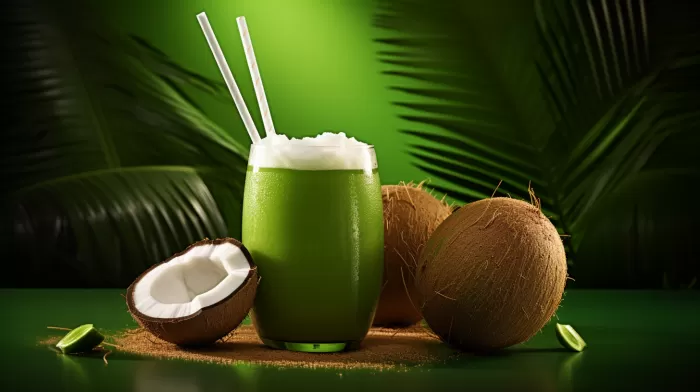Potassium is an essential electrolyte that prevents cramps during exercise, and many people don’t realize that the typical American diet falls short of this crucial mineral. Although sports drinks like Gatorade claim to provide electrolytes, there’s a natural option that offers up to five times more potassium: coconut water. A comprehensive analysis of this refreshing beverage was presented at the 244th National Meeting & Exposition of the American Chemical Society.
Even if you’re not a fitness enthusiast, incorporating coconut water into your daily routine can provide numerous health benefits, says Chhandashri Bhattacharya, Ph.D. “Coconut water is a natural drink that has everything your average sports drink has and more,” she explains. “It has five times more potassium than Gatorade or Powerade. Whenever you get cramps in your muscles, potassium will help you to get rid of the cramps. It’s a healthy drink that replenishes the nutrients that your body has lost during a moderate workout.”
The Science Behind Coconut Water
Coconut water can be found in abundance inside young, green coconuts, and it has long been a popular beverage in tropical regions, commonly sold by street and beach vendors who sell green coconuts with a drinking straw attached to the top. Bhattacharya’s team analyzed a variety of sports drinks, including coconut water, Gatorade, and Powerade, to determine the best option for electrolyte replacement.
According to their research, coconut water contains up to 1,500 mg/liter of potassium, compared to just 300 mg/liter for Powerade and Gatorade. Moreover, coconut water offers 400 mg/liter of sodium, comparable amounts of magnesium, and a similar carbohydrate content to other sports drinks.
When to Choose Coconut Water Over Sports Drinks
Although coconut water provides more potassium than other sports drinks, its lower sodium content makes it less suitable for those engaging in intense workouts or activities that cause excessive sweating. That’s because our body loses more sodium than potassium through sweat, meaning coconut water alone may not be enough to replenish lost sodium levels.
However, there’s a simple solution: adding a pinch of salt to your coconut water should compensate for the lower sodium content, making the natural drink just as effective as its commercial counterparts. By choosing coconut water over heavily processed sports drinks, you’ll not only reduce your intake of added sugars and artificial ingredients but also gain the benefits of other naturally occurring nutrients in coconut water, such as antioxidants, amino acids, and enzymes.
Additional Benefits of Coconut Water
In addition to being an excellent source of potassium, coconut water provides other health benefits. For instance, it has antioxidant properties that protect cells from damage caused by free radicals. It aids in digestion, thanks to its high fiber content, and it’s also been shown to reduce blood pressure and support heart health.
Furthermore, it’s a natural diuretic, which means it promotes the production of urine and helps flush toxins from the body to prevent urinary infections. Plus, while coconut water has a low-calorie count, it’s rich in essential nutrients, vitamins, minerals, and amino acids – making it an excellent hydrating option for those watching their weight.
Key Takeaways
While many people turn to popular sports drinks like Gatorade and Powerade to replenish electrolytes after a workout, coconut water is a more natural and nutrient-rich alternative. Providing up to five times more potassium than conventional sports drinks, coconut water is a superior choice for those seeking a healthy, all-natural option for hydration and electrolyte replacement.
For those engaged in strenuous exercise or experiencing heavy sweating, adding a small amount of salt to coconut water effectively addresses its lower sodium content, ensuring that all necessary minerals are replenished following a workout. Additionally, coconut water offers a multitude of other health benefits, including antioxidants, amino acids, and natural enzymes, making it a powerful ally in promoting overall wellness.



